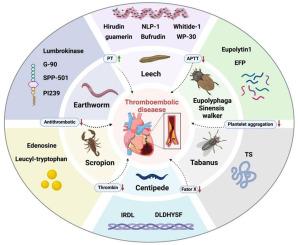Anticoagulant peptides derived from animal-sourced traditional Chinese medicine and their pharmacological effects
Pharmacological Research - Modern Chinese Medicine
Pub Date : 2024-10-15
DOI:10.1016/j.prmcm.2024.100529
引用次数: 0
Abstract
Introduction
Peptide drugs are highly regarded for their therapeutic versatility, safety, and efficacy in treating conditions like cancer, hepatitis, and diabetes. Animal-derived Traditional Chinese Medicines (TCMs) are promising peptide sources, often outperforming plant-based alternatives. The therapeutic effects of leeches, earthworms, and Eupolyphaga sinensis Walkers in thrombosis and blood stasis have been clinically validated, with anticoagulant peptides as key components; however, their pharmacological mechanisms remain unclear. This review categorizes and summarizes anticoagulant peptides from animal-derived TCMs by species.
Methods
This study explores the important role of anticoagulant peptides from animal-sourced medicine in treating thrombosis-related diseases. A literature search using keywords like “anticoagulant peptides,” “leech peptides,” and “earthworm peptides” yielded over 120 articles, of which 85 were selected. Priority was given to studies from the past 20 years, while significant historical research was also noted. Articles lacking specific information on the animal sources of these peptides were excluded. Data were obtained from a diverse range of references, including both ancient and modern texts, the Chinese Pharmacopoeia, Web of Science, PubMed, ScienceDirect, Google Scholar, Springer, and CNKI.
Conclusion
This study reviews six promising animal-derived anticoagulant drugs currently in clinical use: leeches, earthworms, scorpions, Eupolyphaga sinensis Walkers, and centipedes. Key peptides under development include hirudin (Hirudo nipponica), WP-30 (Whitmania pigra), Lomburkinase (Eisenia foetida). These peptides exhibit potent anticoagulant, antiplatelet, and anti-inflammatory effects, rendering them valuable in the treatment of cardiovascular diseases, stroke, amenorrhea, cerebral thrombosis, and atherosclerosis.
Discussion
This study critically evaluates the therapeutic mechanisms of anticoagulant peptides in animal-sourced medicines, emphasizing the potential of peptide-based therapies across different strains of the same species for traditional Chinese medicine and modern clinical use. Despite promising potential, challenges such as low bioavailability, difficulties in peptide identification, pharmacological evaluation, and toxicity assessment persist. Addressing these issues will facilitate deeper exploration and development of peptide-based therapies.

从动物源中药中提取的抗凝肽及其药理作用
导言多肽药物因其治疗癌症、肝炎和糖尿病等疾病的多样性、安全性和有效性而备受推崇。动物来源的中药是很有前景的多肽来源,其疗效往往优于植物来源的替代品。水蛭、蚯蚓和蟅虫对血栓和瘀血的治疗效果已得到临床验证,其中抗凝肽是关键成分;然而,它们的药理机制仍不清楚。本综述按物种对动物源中药中的抗凝肽进行了分类和总结。方法本研究探讨了动物源中药中的抗凝肽在治疗血栓相关疾病中的重要作用。使用 "抗凝肽"、"水蛭肽 "和 "蚯蚓肽 "等关键词进行文献检索,共获得 120 多篇文章,其中 85 篇被选中。优先考虑过去 20 年的研究,同时也注意到重要的历史研究。缺乏有关这些肽的动物来源的具体信息的文章被排除在外。数据来源于各种参考文献,包括古今中外文献、《中国药典》、Web of Science、PubMed、ScienceDirect、Google Scholar、Springer 和 CNKI。正在开发的主要肽类包括水蛭素(Hirudo nipponica)、WP-30(Whitmania pigra)、Lomburkinase(Eisenia foetida)。本研究对动物源药物中抗凝肽的治疗机制进行了批判性评估,强调了基于肽的疗法在传统中药和现代临床应用中对同一物种不同品系的潜力。尽管潜力巨大,但生物利用率低、多肽鉴定、药理评价和毒性评估困难等挑战依然存在。解决这些问题将有助于深入探索和开发多肽疗法。
本文章由计算机程序翻译,如有差异,请以英文原文为准。
求助全文
约1分钟内获得全文
求助全文

 求助内容:
求助内容: 应助结果提醒方式:
应助结果提醒方式:


